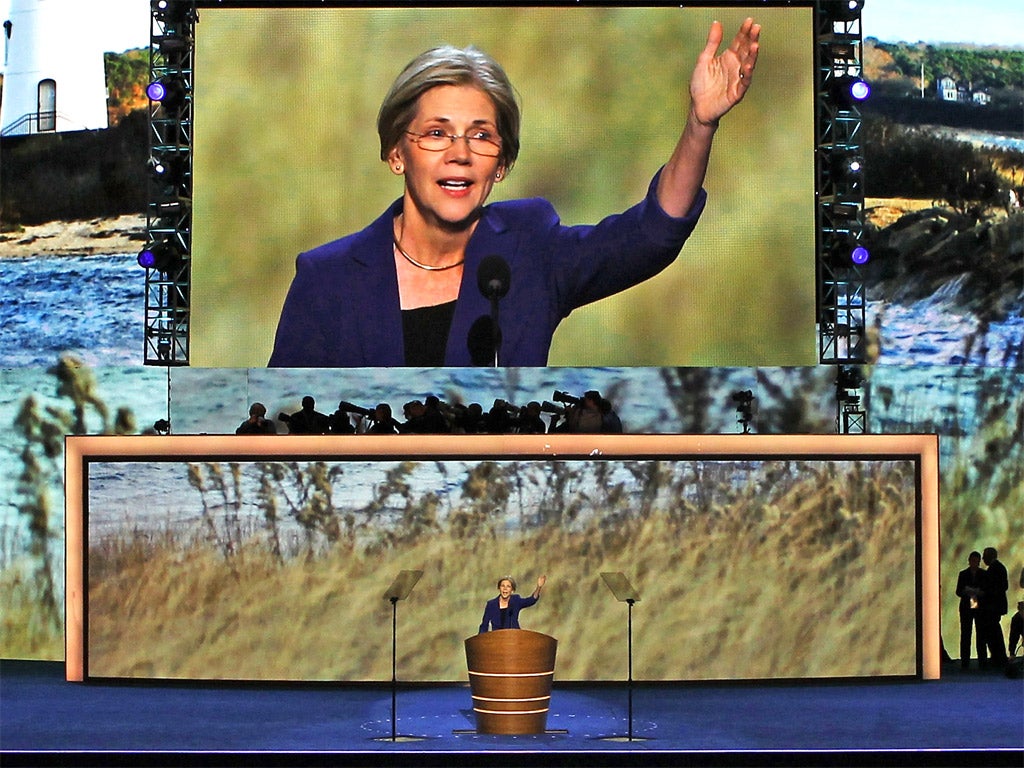Senator Elizabeth Warren: The outsider who could upset Hillary Clinton’s presidential bid
The liberal Senator from Massachusetts is being viewed as a possible Democratic rival

It is widely held that when the names go into the hat for the 2016 Democrat presidential primary, there is only one that will matter: Hillary Clinton. Yet some in her party hope the frontrunner could again be upset by a challenge from an outsider – and their preferred candidate appears to be the liberal Senator from Massachusetts, Elizabeth Warren. In its latest cover story, political magazine The New Republic suggests a Warren presidential run would be “Hillary’s nightmare”, and describes Senator Warren as “the probable face” of a progressive “insurgency”.
Warren, 64, has made her name as a critic of the financial industry. Clinton, by contrast, is thought of as sympathetic to Wall Street; her husband presided over widespread deregulation while in the White House. If the issue remains at the forefront of voters’ minds by 2016, the magazine argues, activist enthusiasm for a Warren candidacy could spread. Markos Moulitsas, publisher of the liberal blog Daily Kos, told the New York Times: “[Warren] is reshaping the Democratic Party and leading its charge toward a more economic populist orientation.”
Democrat Bill de Blasio’s recent victory in the New York mayoral election, on a platform of correcting income inequality, has also emboldened grassroots Democrats. Adam Green, co-founder of the Progressive Change Campaign Committee, told The New Republic that his fellow progressives were yet to be sold on the predicted Clinton candidacy. “There’s very much a wait-and-see approach to Hillary among progressives,” he said. “It’s mutually exclusive to be a real hero for reform and accountability and to have a [fund-raising] strategy that relies on Wall Street.”
Disillusion with the financial system led in part to the present fissure between mainstream Republicans and the Tea Party. Less well documented is the narrower split between populist Democrats and their colleagues. Observers of the Tea Party “insurgency” might see a mirror of that movement in the bumper stickers declaring: “I’m from the Elizabeth Warren Wing of the Democratic Party”.
Originally from Oklahoma, Warren was previously a Harvard Law School professor specialising in bankruptcy law. Following the financial crisis, as a special adviser to the Treasury Secretary, she was instrumental in the creation of the Consumer Financial Protection Bureau. In 2012, she challenged Republican incumbent Scott Brown for the Massachusetts senate seat. Upon her election, she was asked to serve on the Senate Banking Committee. One leading financier told the New York Times that her appointment caused “widespread terror” on Wall Street.
Her fundraising emails are said to draw a greater response than any other Democrat besides Clinton and President Obama - she amassed $42m (£26m) for her 2012 Senate race. She also attracts a million views for her YouTube videos explaining the financial crisis.
And yet, speculation about a Warren presidential run remains mere media chatter for now. The Senator’s camp has insisted she will not seek the presidency, and she was recently among a group of Democrat woman senators who signed a letter urging Clinton to run. Premature polls among potential voters in crucial primary states show Clinton streets ahead of her rivals, with a 48-point lead over Warren in Iowa, and a 53-point lead in New Hampshire.
On Monday, Ed Rendell, former Democrat Governor of Pennsylvania, pooh-poohed the notion Warren could be his party’s presidential nominee. “If Hillary’s in the race, she has zero chance,” he told CNBC.
Warren has declined to be drawn by the magazine on if she was mulling a run in 2016. “You’ve asked me about the politics. All I can do is take you back to the principle part of this,” she told The New Republic. “I know what I am in Washington to do: I’m here to fight for hardworking families.”
Join our commenting forum
Join thought-provoking conversations, follow other Independent readers and see their replies
Comments
Bookmark popover
Removed from bookmarks